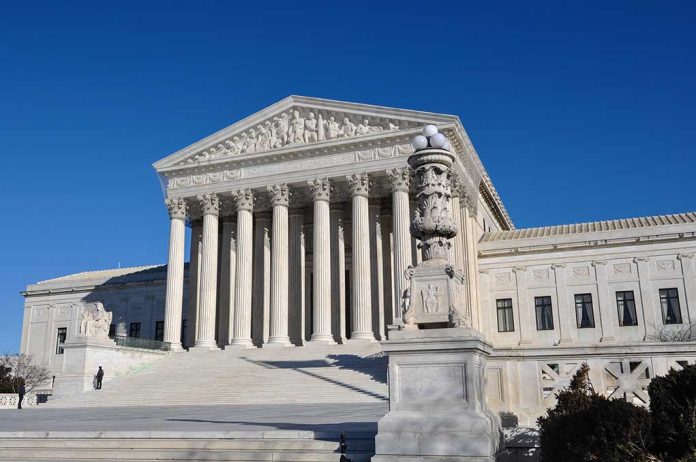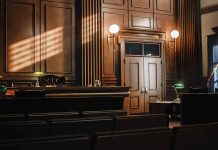
The Supreme Court’s decision to decline a case challenging pro-life speech restrictions near abortion clinics sparks controversy and debate over free speech rights.
Key Takeaways
- The Supreme Court refused to hear a challenge to restrictions on pro-life speech within 100 feet of abortion facilities.
- Justices Clarence Thomas and Samuel Alito expressed willingness to reconsider past rulings on abortion protest restrictions.
- The case involved Coalition Life challenging a now-repealed Carbondale, Illinois ordinance.
- Justice Thomas criticized the Court’s historical stance, arguing it has compromised free speech freedoms.
- The decision reignites the debate on balancing free speech rights with protecting individuals at healthcare facilities.
Supreme Court Declines to Hear Pro-Life Speech Case
In a move that has sparked controversy among conservative circles, the Supreme Court has declined to hear a case challenging restrictions on pro-life speech near abortion clinics. The case, brought forward by Coalition Life, contested a Carbondale, Illinois ordinance that limited pro-life speech within 100 feet of abortion facilities. This decision has reignited the debate over free speech rights and the balance between protecting individuals accessing healthcare facilities and the right to protest.
US supreme court rejects anti-abortion challenges to clinic ‘buffer zones’
Conservative-dominated court declined to hear two cases opposing ordinances limiting protests near abortion clinics. The Guardian pic.twitter.com/R2fZoSHqzu
— ˶˃ ᵕ ˂ NewsCat 📰🗞️NO DMs˶ ˃ ᵕ ˂ (@typocatCAv2) February 25, 2025
The Supreme Court’s refusal to hear the case has left in place a precedent that upholds “buffer zone” laws around abortion clinics. This decision is seen as a setback for abortion opponents who argue that such restrictions infringe on their First Amendment rights. The case in question involved not only the Carbondale ordinance but also similar laws in other jurisdictions, including Englewood, New Jersey.
Justices Thomas and Alito Express Dissent
While the majority of the Court declined to hear the case, Justices Clarence Thomas and Samuel Alito stood out in their willingness to revisit past rulings on abortion protest restrictions. Justice Thomas, in particular, issued a strong dissent, criticizing the Court’s 2000 decision in Hill v. Colorado, which upheld similar restrictions on pro-life speech near abortion clinics. “Hill has been seriously undermined, if not completely eroded, and our refusal to provide clarity is an abdication of our judicial duty. I would have taken this opportunity to explicitly overrule Hill”, Justice Clarence Thomas stated.
Thomas argued that the Hill decision has turned the First Amendment “upside down” and that constitutional rights are at stake while the Supreme Court refuses to reevaluate this precedent. This dissent highlights the ongoing debate within the Court about the balance between free speech and other societal concerns.
The Carbondale Ordinance and Its Repeal
The case centered around a Carbondale, Illinois ordinance that restricted pro-life sidewalk counseling within 100 feet of abortion facilities. However, as Coalition Life prepared to appeal to the Supreme Court, Carbondale repealed the ordinance. Peter Breen of the Thomas More Society, representing Coalition Life, claimed that this repeal was a tactical move to avoid Supreme Court scrutiny.
Despite the ordinance’s repeal, the broader issue of free speech restrictions near abortion clinics remains unresolved. Coalition Life Executive Director Brian Westbrook expressed disappointment with the Court’s decision but vowed to continue the organization’s work advocating for alternatives to abortion.
Ongoing Debate and Future Implications
The Supreme Court’s decision not to hear this case leaves in place a contentious precedent that continues to divide opinion. Pro-life activists argue that buffer zone laws infringe on their free speech rights and limit their ability to offer alternatives to women considering abortion. On the other hand, supporters of these laws contend that they are necessary to protect individuals accessing healthcare services from harassment and intimidation.
As the debate continues, several states are considering or have already implemented similar buffer zone laws. New York upheld a 15-foot buffer zone law in 2019, and states like California, Maryland, and Washington are considering similar measures. The Supreme Court’s refusal to revisit this issue at this time means that lower courts will continue to grapple with these cases, potentially leading to inconsistent rulings across different jurisdictions.
The ongoing legal battles surrounding abortion clinic buffer zones underscore the complex interplay between free speech rights and public safety concerns. As the nation continues to navigate the aftermath of the overturning of Roe v. Wade, it is likely that these issues will remain at the forefront of legal and public discourse for the foreseeable future.
Sources:
Supreme Court Rejects Challenge To Law Restricting Pro-Life Speech Outside Abortion Facilities
Supreme Court rejects challenges to abortion clinic ‘buffer zone’ laws that restrict protesters
Supreme Court Declines Pro-Life Challenge Against Abortion Clinic Restrictions













